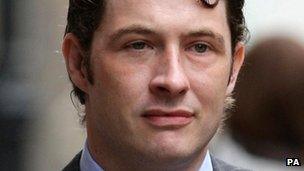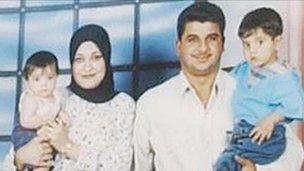Baha Mousa death: Army doctor Derek Keilloh struck off
- Published

Dr Derek Keilloh was found guilty of misconduct by the MPTS
A former Army doctor has been struck off the medical register after his misconduct over the death of Iraqi detainee Baha Mousa in 2003.
Derek Keilloh, of Aberdeen, was a medical officer with the Queen's Lancashire Regiment (QLR) in Basra when Mr Mousa died in British Army custody.
The Medical Practitioners Tribunal Service heard he had 93 injuries.
The MPTS said Dr Keilloh, who practises in North Yorkshire, was aware of the injuries but failed to report them.
He supervised a failed resuscitation attempt to save the life of Mr Mousa, who had been hooded, handcuffed and severely beaten by soldiers.
The hotel receptionist had been arrested in a crackdown by soldiers who believed, wrongly, that he was an insurgent involved in the murder of four of their colleagues the month before.
The MPTS recognised Dr Keilloh, now a GP at Mayford House Surgery in Northallerton, did "everything possible" to save Mr Mousa's life, in a setting that was "highly charged, chaotic, tense and stressful".
Dr Keilloh claimed he saw only dried blood around Mr Mousa's nose while giving mouth-to-mouth and CPR.
But the panel ruled he must have seen the injuries and had a duty to act.
The MPTS questioned his honesty after he lied to Army investigators about the injuries and, in sticking to his story, giving evidence in subsequent courts-martial and a public inquiry.
The panel also said the doctor did not do enough to protect his patients, the other detainees, from further mistreatment, breaking a "fundamental tenet" of the medical profession.
He told soldiers not to beat other detainees, but the panel ruled he should have blown the whistle to senior officers about what went on.
The MPTS said it was the "repeated dishonesty" in claiming not to have seen injuries to Mr Mousa that was wholly unacceptable.
Dr Brian Alderman, the panel chairman, said: "In all the circumstances, the panel determined that erasure is the only appropriate sanction in this case.
"It is considered that this action is the only way proper standards of conduct and behaviour may be upheld and trust in the profession as a whole may be restored.
"The panel has identified serious breaches of good medical practice and, given the gravity and nature of the extent and context of your dishonesty, it considers that your misconduct is fundamentally incompatible with continued registration."

Baha Mousa was arrested when weapons were discovered at the hotel where he worked
Dr Keilloh, a married father of two who qualified in medicine at the University of Aberdeen, has 28 days to appeal against the decision in the High Court.
Mr Mousa's death led to a public inquiry, led by Sir William Gage, which concluded that his death was caused by a combination of his weakened physical state and a final struggle with his guards.
The final report strongly criticised the "corporate failure" by the Ministry of Defence and the "lack of moral courage to report abuse" within Preston-based QLR.
It named 19 soldiers who assaulted Mr Mousa and other detainees and found that many others, including several officers, must have known what was happening.
Six soldiers were cleared at a court martial in 2007, while Cpl Donald Payne became the first member of the British armed forces convicted of a war crime when he pleaded guilty to inhumanely treating civilians.
The Ministry of Defence agreed to pay £2.83m in compensation to the families of Mr Mousa and nine other Iraqi men abused by UK troops.
- Published16 December 2012